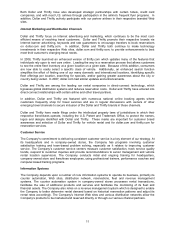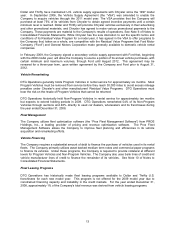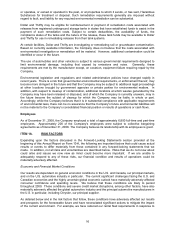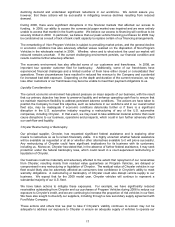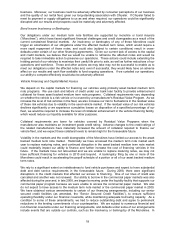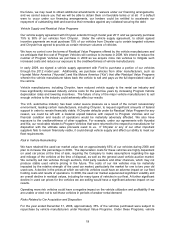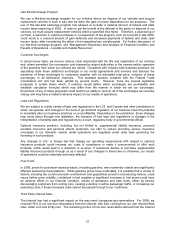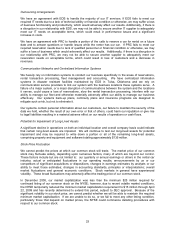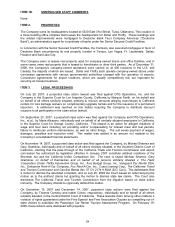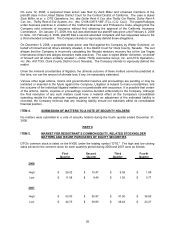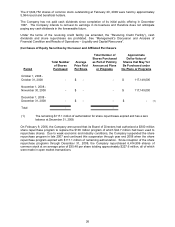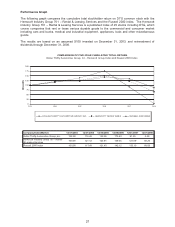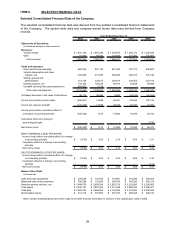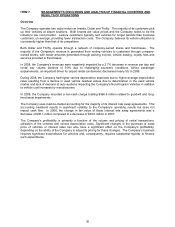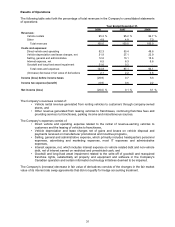Thrifty Car Rental 2008 Annual Report Download - page 23
Download and view the complete annual report
Please find page 23 of the 2008 Thrifty Car Rental annual report below. You can navigate through the pages in the report by either clicking on the pages listed below, or by using the keyword search tool below to find specific information within the annual report.Like-Kind Exchange Program
We use a like-kind exchange program for our vehicles where we dispose of our vehicles and acquire
replacement vehicles in such a way that we defer the gain on these dispositions for tax purposes. The
use of this like-kind exchange program has allowed us to defer a material amount of federal and state
income taxes beginning in 2002. In order to get the benefit of the deferral of the gains on disposal of our
vehicles, we must acquire replacement vehicles within a specified time frame. Therefore, a downsizing of
our fleet, a reduction in vehicle purchases or a suspension of the program, such as occurred in late 2008,
could result in a reduced amount of gain deferrals and increased payments of federal and state cash
income taxes, after considering the effect of net operating loss carryforwards. For further discussion of
our like-kind exchange program, see “Management Discussion and Analysis of Financial Condition and
Results of Operations – Liquidity and Capital Resources”.
Customer Surcharges
In almost every state, we recover various costs associated with the title and registration of our vehicles
and, where permitted, the concession cost imposed by airport authorities or the owners and/or operators
of the premises from which our vehicles are rented. Consistent with industry-wide business practices, we
separately state these additional surcharges in our rental agreements and invoices and disclose the
existence of these surcharges to customers together with an estimated total price, inclusive of these
surcharges, in all distribution channels. This standard practice complies with the Federal Trade
Commission Act and has been upheld by several courts. However, there are several legislative
proposals in certain states which, if enacted, would define which surcharges are permissible and
establish calculation formulas which may differ from the manner in which we set our surcharges.
Enactment of any of these proposals could restrict our ability to recover all of the surcharges we currently
charge and may have a material adverse impact on our results of operations.
Laws and Regulations
We are subject to a wide variety of laws and regulations in the U.S. and Canada and other jurisdictions in
which we operate, and changes in the level of government regulation of our business have the potential
to materially alter our business practices or our profitability. Depending on the jurisdiction, those changes
may come about through new legislation, the issuance of new laws and regulations or changes in the
interpretation of existing laws and regulations by a court, regulatory body or governmental official.
Optional insurance products, including, but not limited to, supplemental liability insurance, personal
accident insurance and personal effects protection, we offer to renters providing various insurance
coverages in our domestic vehicle rental operations are regulated under state laws governing the
licensing of such products.
Any changes in U.S. or foreign law that change our operating requirements with respect to optional
insurance products could increase our costs of compliance or make it uneconomical to offer such
products, which would lead to a reduction in revenue. If customers decline to purchase supplemental
liability insurance products through us as a result of any changes in these laws or otherwise, our results
of operations could be materially adversely affected.
Fuel Costs
In 2008, prices for petroleum-based products, including gasoline, were extremely volatile and significantly
affected automotive travel patterns. While gasoline prices have moderated, it is possible that a variety of
factors, including the current economic environment and geopolitical unrest in oil-producing nations, could
cause further price volatility. Limitations in fuel supplies or significant increases in fuel prices could have
an adverse effect on our financial condition, results of operations and cash flows, either by directly
discouraging customers from renting cars, causing a decline in airline passenger traffic, or increasing our
operating costs, if these increased costs cannot be passed through to our customers.
Third Party Internet Sites
The Internet has had a significant impact on the way travel companies get reservations. For 2008, we
received 76% of our non-tour reservations from the Internet, with 44% coming from our own Internet Web
sites, dollar.com and thrifty.com. The remaining portion of non-tour reservations derived from the Internet
21


